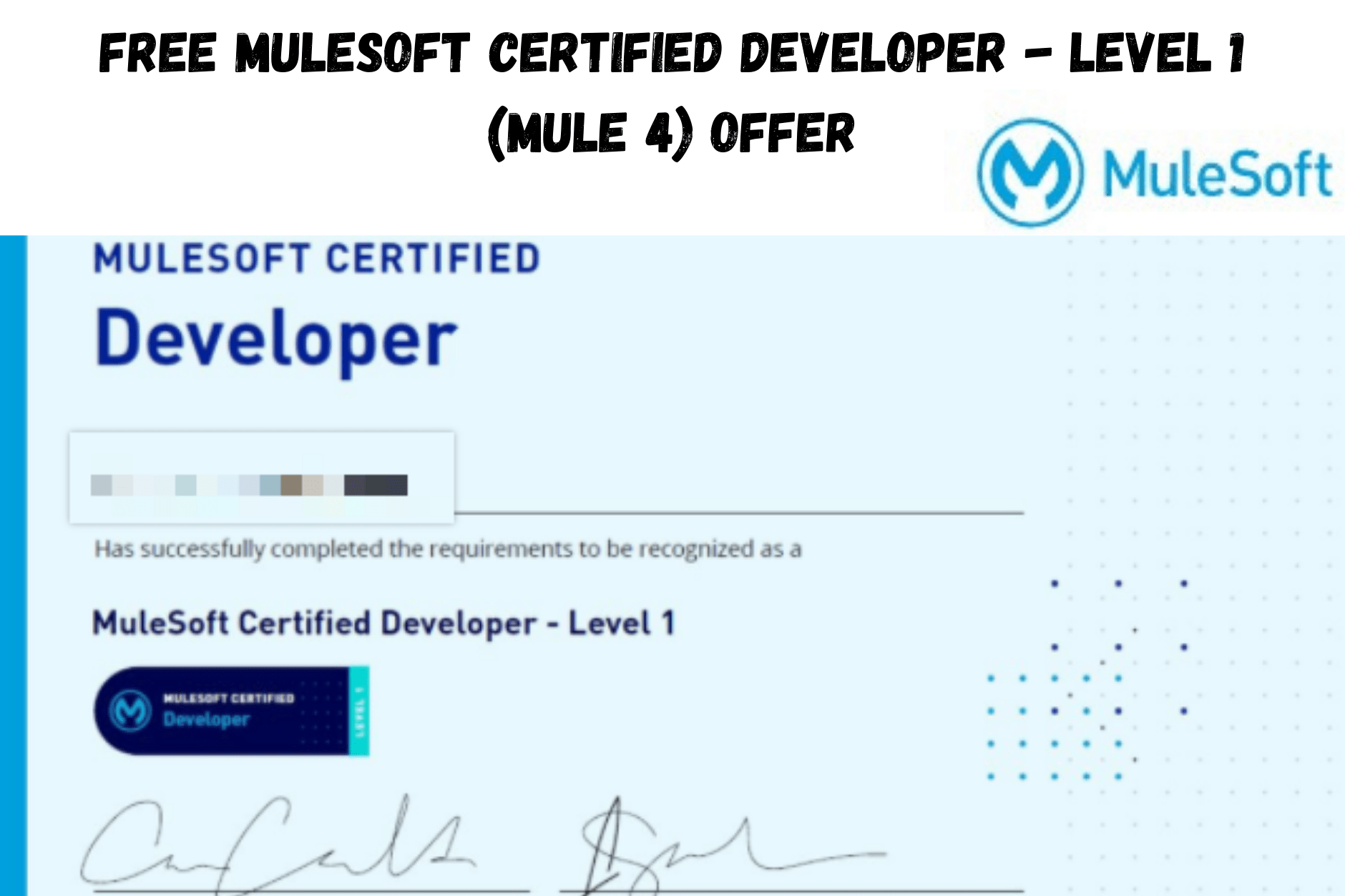Free MuleSoft Certified Developer – Level 1 (Mule 4) Offer for a limited time
This is the best time to get yourself equipped with another industry certification for free(only for a limited period)
MuleSoft’s Certification Success Series
Table of Contents
Finish 2020 strong by adding the MuleSoft Certified Developer – Level 1 (Mule 4) certification to your list of achievements! MuleSoft Training and Certification is bringing back a series of free instructor lectures to ensure you’re fully prepared.
Mark your calendars to attend the sessions most applicable to you, then sign up to sit your exam.
To get the most out of these lectures, make sure that you are registered for and have made progress in the Anypoint Platform Development: Fundamentals (Mule 4) course.
Exams attempts are granted upon completion of the course, available automatically in your learner dashboard.
Users also liked : Free cybersecurity Foundation(csfpc) Answers
Week of Dec 7 – 11, 2020
- Modules 1 – 3: Monday lectures – Register
- Modules 4 – 6: Tuesday lectures – Register
- Modules 7 – 9: Wednesday lectures – Register
- Modules 10 – 11: Thursday lectures – Register
- Modules 12 – 13: Friday lectures – Register
Week of Dec 14 – 18, 2020
- Modules 1 – 3: Monday lectures – Register
- Modules 4 – 6: Tuesday lectures – Register
- Modules 7 – 9: Wednesday lectures – Register
- Modules 10 – 11: Thursday lectures – Register
- Modules 12 – 13: Friday lectures – Register
Week of Dec 21 – 25, 2020
- Modules 1 – 3: Monday lectures – Register
- Modules 4 – 6: Tuesday lectures – Register
- Modules 7 – 9: Wednesday lectures – Register
- Modules 10 – 11: Thursday lectures – Register
- Modules 12 – 13: Friday lectures – Register
Topics covered on Mondays
- Module 1: Introducing Application Networks and API-Led Connectivity
- Module 2: Introducing Anypoint Platform
- Module 3: Designing APIs
Topics covered on Tuesdays
- Module 4: Building APIs
- Module 5: Deploying and Managing APIs
- Module 6: Accessing and Modifying Mule Events
Topics covered on Wednesdays
- Module 7: Structuring Mule Applications
- Module 8: Consuming Web Services
- Module 9: Controlling Event Flow
Topics covered on Thursdays
- Module 10: Handling Errors
- Module 11: Writing DataWeave Transformations
Topics covered on Fridays
- Module 12: Triggering Flows
- Module 13: Processing Record
Looking for other flexible training options?
Multiple instructor-led courses with alternative schedules in Jan and Feb 2021. See schedule.
Anypoint Platform Development: Fundamentals (Mule 4)
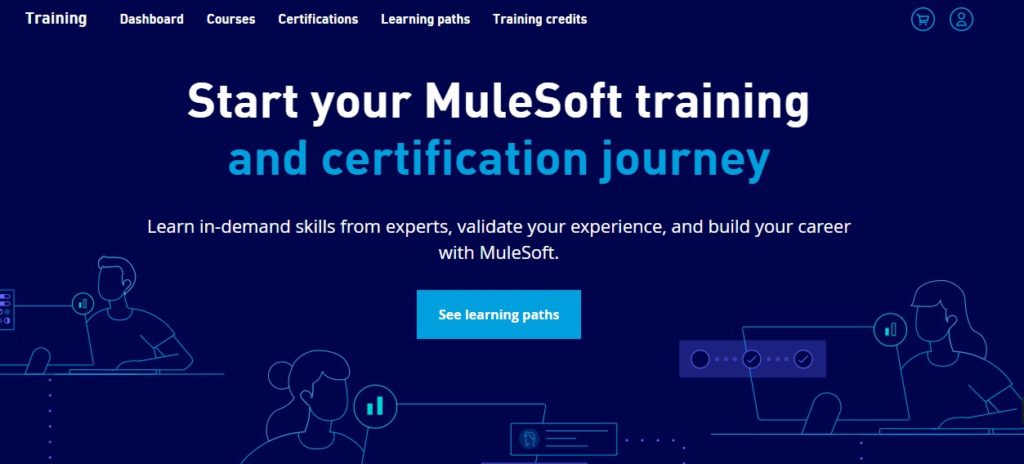
Summary of Free MuleSoft Certified Developer – Level 1 (Mule 4) Offer
This course is for developers and architects who want to get hands-on experience using Anypoint Platform™ to build APIs and integrations.
In the first part, students use Anypoint Platform to discover, consume, design, build, deploy, manage, and govern APIs.
In the second and third parts, students focus on using Mule 4 and Anypoint Studio to build applications for use as API implementations and integrations.
The course prepares students to take the MuleSoft Certified Developer – Level 1 (Mule 4) exam.
Upon successful completion of the course, students automatically receive two exam attempts.
Get a datasheet for the course here.
Note: For the Mule 3 version of the course, go here.

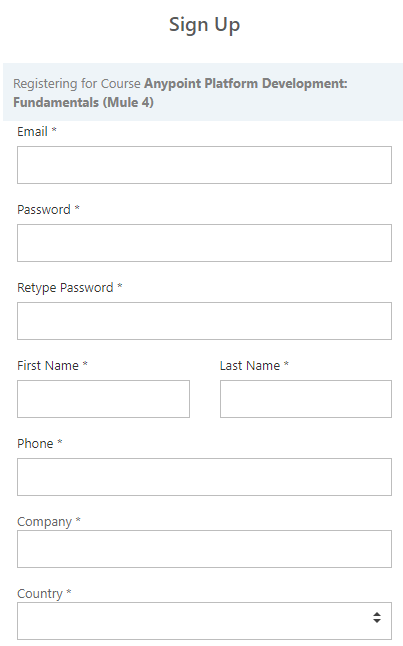
MuleSoft Certified Developer – Level 1 (Mule 4)
A MuleSoft Certified Developer – Level 1 should be able to successfully work on basic Mule 4 projects with guidance and supervision. The MCD – Level 1 (Mule 4) exam validates that a developer has the required knowledge and skills to design, build, test and debug, deploy, and manage basic APIs and integrations: moving from Anypoint Platform to Anypoint Studio and back. Certified candidates should be able to:
- Use MuleSoft-hosted Anypoint Platform to take a basic API through all the steps of its lifecycle: design, build, deploy, manage, and govern.
- Use Anypoint Studio to build, test, and debug basic integrations and API implementations.
- Connect to a range of resources including databases, files, web services, SaaS applications, and JMS queues.
- Perform basic data transformations using DataWeave 2.0.
- Control event flow and handle errors.
- Process batch records.
Format
- Format: Multiple-choice, closed book, proctored
- Length: 60 questions
- Duration: 120 minutes (2 hours)
- Pass score: 70%
- Language: English
You can take the exam a maximum of 5 times, with a 24-hour wait between each attempt.
Objectives Free MuleSoft Certified Developer – Level 1 (Mule 4) Offer
At the end of this course, students should be able to:
- Build an application network using API-led connectivity and Anypoint Platform.
- Use Anypoint Platform to discover, consume, design, build, deploy, manage, and govern APIs.
- Connect to databases, files, web services, SaaS applications, JMS queues, and more.
- Add application logic, handle errors, and transform data using DataWeave.
- Structure applications to facilitate development and deployment.
- Handle batch data processing.
Prerequisites
- Experience with an object-oriented language
- A basic understanding of data formats such as XML, CSV, and JSON
- A basic understanding of typical integration technologies such as HTTP, JMS, JDBC, REST, and SOAP
Setup requirements
- A computer with:
- At least 8-16 GB RAM (16 highly recommended), 2GHz CPU, and 10GB available storage
- A minimum screen resolution of 1024×768
- Internet access to ports 80 and 3306 (with > 5Mbps download and > 2Mbps upload)
- The latest version of Chrome, Safari, Firefox, or Edge
- An Anypoint Platform account
- Anypoint Studio 7.7.0 or later with embedded Mule 4.3 runtime
- A Salesforce Developer account (not a standard account) and API Access token
- Advanced REST Client (or any other REST client application)
- (Optional) If no internet access to ports 80 and 3306, OpenJDK 8 (not 11 or a later version)
Get a detailed setup document here.
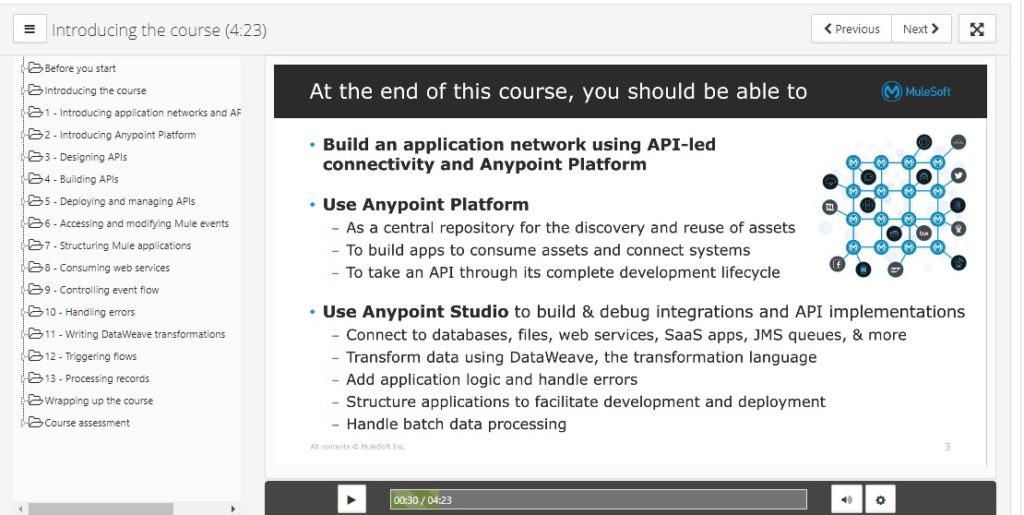
PART 1: Building application networks with Anypoint Platform
Module 1: Introducing application networks and API-led connectivity
Module 2: Introducing Anypoint Platform
Module 3: Designing APIs
Module 4: Building APIs
Module 5: Deploying and managing APIs
PART 2: Building applications with Anypoint Studio
Module 6: Accessing and modifying Mule events
Module 7: Structuring Mule applications
Module 8: Consuming web services
Module 9: Controlling event flow
Module 10: Handling errors
Module 11: Writing DataWeave transformations
PART 3: Building applications to synchronize data
Module 12: Triggering flows
Module 13: Processing records
Steps to schedule exam :
- Login to Training
- Complete Anypoint Platform Development: Fundamentals (Mule 4)
- On your Dashboard, Under Enrolments, you will see “Certification Exams”
- Click to view your exam and click on “Schedule”
- Please select a date and time to take the exam.
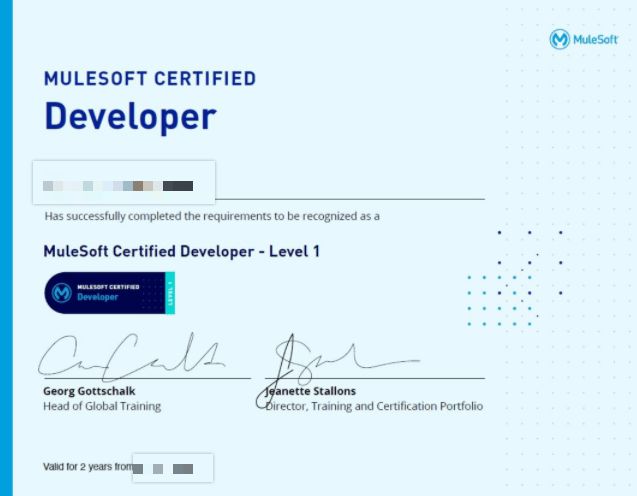
Validity
The certification expires two years from the date you pass the exam.
Preparation
You can best prepare for the exam by taking the instructor-led Anypoint Platform Development: Fundamentals (Mule 4) course and completing the accompanying Do-It-Yourself (DIY) exercises and quiz. Candidates should be familiar with all of the content in the course and be able to apply the concepts in actual projects.
The following resources are available to help you prepare:
- Instructor-led training: Anypoint Platform Development: Fundamentals (Mule 4)
- Recommended as the most effective and efficient method of preparation
- 5-day class
- Private, public, onsite, and online classes available
- Includes two attempts for this exam
- Self-study training: Anypoint Platform Development: Fundamentals (Mule 4)
- 60+ step-by-step exercises to teach you the basics
- All content available instantly for you to complete at your own pace
- Supported by the peer-to-peer MuleSoft training forum
- Successful completion of the course includes two MuleSoft-sponsored attempts for this exam
- Self-assessment quiz
- 5+ multiple-choice questions for each course module
- Identifies strengths and weaknesses
- Do-it-yourself exercises
- 10+ DIY exercises to get experience with and apply the knowledge gained in class
- Starting code and solutions provided
- Can be completed in any order
Happy Learning!!
